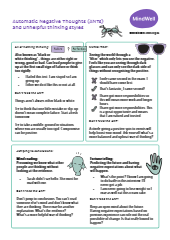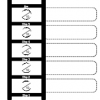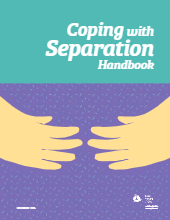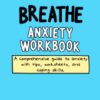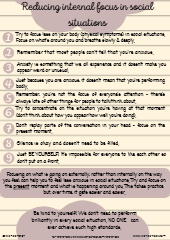 The Reducing Internal Focus in Social Situations Information Page is a helpful guide designed to assist individuals in managing anxiety during social interactions. Developed by WeHeartCBT, this resource provides practical advice on shifting focus from internal sensations to the external environment, thereby reducing social anxiety and improving overall social performance.
The Reducing Internal Focus in Social Situations Information Page is a helpful guide designed to assist individuals in managing anxiety during social interactions. Developed by WeHeartCBT, this resource provides practical advice on shifting focus from internal sensations to the external environment, thereby reducing social anxiety and improving overall social performance.
The information page offers several key strategies to help individuals feel less anxious in social settings:
-
Shift Focus Outward: Instead of concentrating on physical symptoms of anxiety, focus on the surroundings and the conversation at hand. This can help distract from internal sensations and reduce anxiety levels.
-
Deep Breathing: Practice slow and deep breathing to help calm the nervous system and maintain focus on the present moment.
-
Positive Reassurance: Remind yourself that most people cannot tell that you are anxious. Anxiety is a common experience and does not make you appear strange or unusual.
-
Stay Present: Avoid replaying parts of the conversation in your head. Focus on the ongoing interaction instead of worrying about how you are perceived.
-
Accept Silence: Understand that silence is normal in conversations and does not need to be filled with constant talk.
-
Be Yourself: Authenticity is key. Do not feel pressured to perform perfectly in every social situation. It is impossible for everyone to like each other, and that is okay.
-
Practice Self-Kindness: Be gentle with yourself and recognize that no one can achieve perfection in social interactions. Lowering self-imposed standards can alleviate unnecessary pressure.
This guide can be used in various settings to help manage social anxiety:
-
Therapeutic Sessions: Mental health professionals can incorporate these strategies into therapy sessions to help clients manage social anxiety.
-
Self-Help: Individuals can use the advice to practice focusing outwardly during social interactions, gradually reducing their anxiety over time.
-
Educational Settings: Teachers and school counsellors can use this resource to support students struggling with social anxiety.
-
Group Therapy: The strategies can be discussed and practiced in group therapy sessions, providing peer support and shared experiences.
By following the strategies outlined in the Reducing Internal Focus in Social Situations Information Page, individuals can learn to manage their social anxiety more effectively and engage more comfortably in social interactions.
FREE PDF DOWNLOAD OF REDUCING INTERNAL FOCUS IN SOCIAL SITUATIONS INFORMATION PAGE

